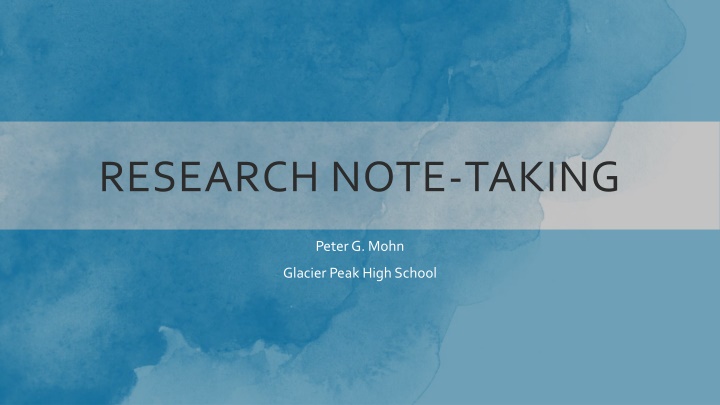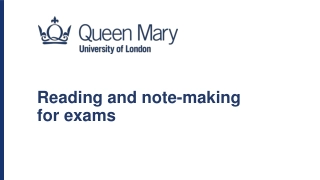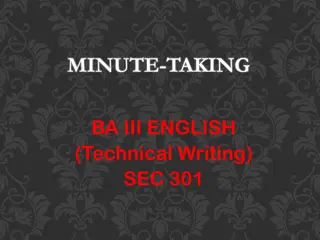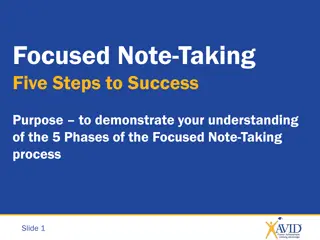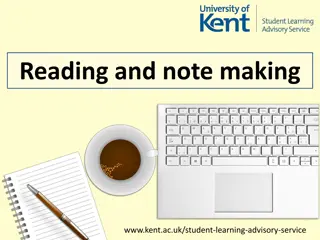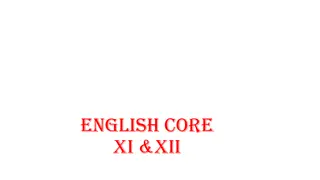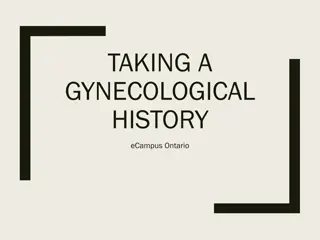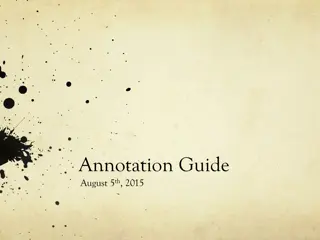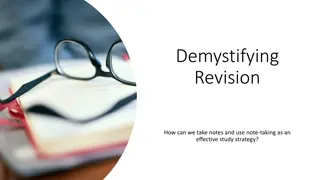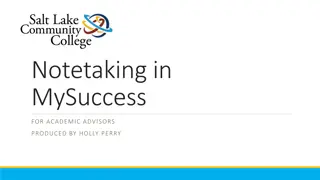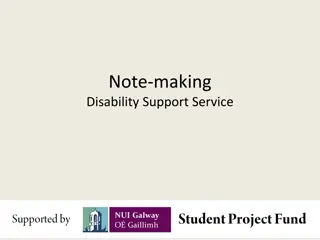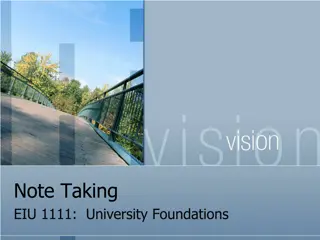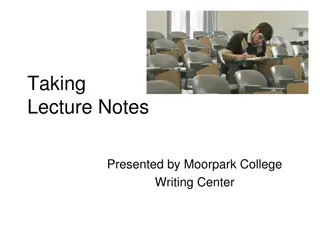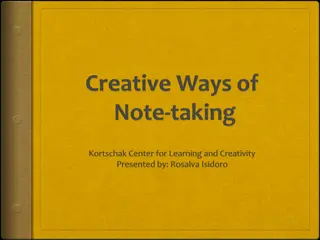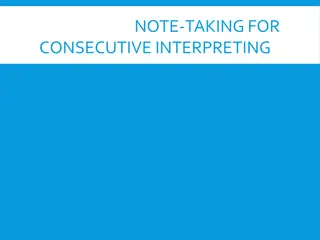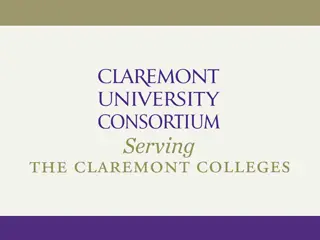Effective Note-Taking Methods and Their Characteristics
Explore various note-taking methods such as Cornell, outlining, and mapping, each with its advantages and disadvantages. Understand how these methods can be utilized in research, lectures, and meetings to enhance organization, reviewing, and understanding of key information. Dive into the specifics of the Cornell note-taking method, its structured approach, and how it simplifies the process of capturing essential concepts efficiently. Discover the benefits and challenges of note sheets like those by Kuhlthau, providing insights on recording, reviewing, and organizing notes effectively. Delve into outlining as a method for organizing information in a structured manner, enabling easy review and comprehension. Lastly, learn about mapping as a visual way to track reading progress, highlighting both its advantages and potential limitations.
Download Presentation

Please find below an Image/Link to download the presentation.
The content on the website is provided AS IS for your information and personal use only. It may not be sold, licensed, or shared on other websites without obtaining consent from the author.If you encounter any issues during the download, it is possible that the publisher has removed the file from their server.
You are allowed to download the files provided on this website for personal or commercial use, subject to the condition that they are used lawfully. All files are the property of their respective owners.
The content on the website is provided AS IS for your information and personal use only. It may not be sold, licensed, or shared on other websites without obtaining consent from the author.
E N D
Presentation Transcript
RESEARCH NOTE-TAKING Peter G. Mohn Glacier Peak High School
NOTE-TAKING METHOD TYPES Cornell method Note-taking method (Kuhlthau) Outlining method Mapping method (graphic organizer) Box and Bullet method Index (note) cards
NOTE-TAKING USES Research Classroom lectures, conferences, meetings Cornell Note sheet (Kuhlthau) Outlining Mapping Box and bullet Index (note) cards Cornell Outlining Mapping Box and bullet Charting Sentence
CORNELL NOTE-TAKING METHOD Author, title Page number Main idea point(s)
CORNELL NOTE-TAPING CHARACTERISTICS Advantages Organized and systematic for recording and reviewing notes Easy to pull out major concepts and ideas Simple and efficient Saves time and effort Do-it-right-the-first-place system Disadvantages None
NOTE SHEET (KUHLTHAU) Advantages Disadvantages Organized and systematic for recording and reviewing notes Slightly harder to organize notes Records bibliographic information Page numbers for reviewing Quotes from sources Paraphrasing and in own words
OUTLINING Advantages Disadvantages Well-organized if done right Requires more thought for accurate organization Records content as well as relationships May not show relationships by sequence Reduces editing Doesn t lend to diversity of review for maximum understanding Easy to review by turning main points into questions
MAPPING Advantages Visually tracks your reading Disadvantages May not see changes from major points to facts Relationships can easily be seen Requires more thought in organizing thoughts Easy to edit by adding numbers, marks and color coding Review will call you to restructure understanding Main points can be written on note cards and pieced together
BOX AND BULLET Advantages Great for organizing notes under main ideas Supporting facts under each main idea Easy to organize main ideas from multiple sources Partial bibliographic information Disadvantages Harder for putting content into your own words Less analysis and evaluation of topic
INDEX CARDS or author s last name Quote, in own words, or
INDEX CARDS Advantages Maximum flexibility in organizing notes Notes contain quotes, paraphrases and own words Excellent way for analysis and evaluation of texts Creates bibliography for reference page Disadvantages Repeats information on each card Sometimes difficult to see the overall picture of the information in a source
RESOURCES Academic Skills Center (2021). Note Taking Systems. California Polytechnic State University: San Luis Obispo, CA. https://asc.calpoly.edu/ssl/notetakingsystems. Retrieved January 19, 2021. EasyBib (May 4, 2018). 4 Note-Taking Systems to Consider. EasyBib: Santa Clara, CA. https://www.easybib.com/guides/4-note-taking-systems-to-consider. Retrieved January 19, 2021. Kuhlthau, Carol (1994). Teaching the Library Research Process, 2nd edition. Scarecrow Press: Metuchen, NJ. p. 141.
